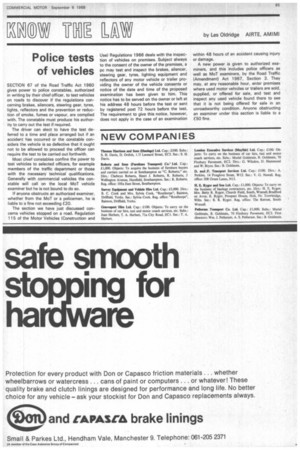Police tests of vehicles
Page 91

If you've noticed an error in this article please click here to report it so we can fix it.
by Les Oldridge AIRTE, AMIMI
SECTION 67 of the Road Traffic Act 1960 gives power to police constables, authorized in writing by their chief officer, to test vehicles on roads to discover if the regulations concerning brakes, silencers, steering gear, tyres, lights, reflectors and the prevention or reduction of smoke, fumes or vapour, are complied with. The constable must produce his authority to carry out the test if required.
The driver can elect to have the test deferred to a time and place arranged but if an accident has occurred or the constable considers the vehicle is so defective that it ought not to be allowed to proceed the officer can require the test to be carried out forthwith.
Most chief constables confine the power to test vehicles to selected officers, for example members of the traffic department or those with the necessary technical qualifications. Generally with commercial vehicles the constable will call on the local MoT vehicle examiner but he is not bound to do so.
If anyone obstructs an authorized examiner, whether from the MoT or a policemen, he is liable to a fine not exceeding £20.
The section we have just discussed concerns vehicles stopped on a road. Regulation 115 of the Motor Vehicles (Construction and Use) Regulations 1966 deals with the inspection of vehicles on premises. Subject always to the consent of the owner of the premises, a pc may test and inspect the brakes, silencer, steering gear, tyres, lighting equipment and reflectors of any motor vehicle or trailer providing the owner of the vehicle consents or notice of the date and time of the proposed examination has been given to him. This notice has to be served on the owner or left at his address 48 hours before the test or sent by registered post 72 hours before the test. The requirement to give this notice, however, does not apply in the case of an examination within 48 hours of an accident causing injury or damage.
A new power is given to authorized examiners, and this includes police officers as well as MoT examiners, by the Road Traffic (Amendment) Act 1967, Section 3. They may, at any reasonable hour, enter premises where used motor vehicles or trailers are sold, supplied, or offered for sale, and test and inspect any used vehicle found there to see that it is not being offered for sale in an unroadworthy condition. Anyone obstructing an examiner under this section is liable to a £50 fine.










































































































































